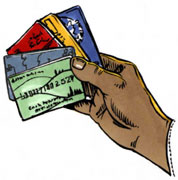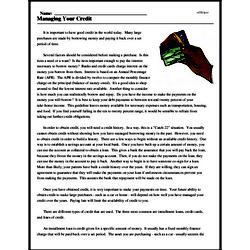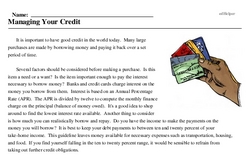Managing Your Credit
National Credit Awareness Day
Reading Comprehension for June 15
It is important to have good credit in the world today. Many large purchases are made by borrowing money and paying it back over a set period of time.
Several factors should be considered before making a purchase. Is this item a need or a want? Is the item important enough to pay the interest necessary to borrow money? Banks and credit cards charge interest on the money you borrow from them. Interest is based on an Annual Percentage Rate (APR). The APR is divided by twelve to compute the monthly finance charge on the principal (balance of money owed). It's a good idea to shop around to find the lowest interest rate available. Another thing to consider is how much you can realistically borrow and repay. Do you have the income to make the payments on the money you will borrow? It is best to keep your debt payments to between ten and twenty percent of your take-home income. This guideline leaves money available for necessary expenses such as transportation, housing, and food. If you find yourself falling in the ten to twenty percent range, it would be sensible to refrain from taking out further credit obligations.
In order to obtain credit, you will need a credit history. In a way, this is a "Catch-22" situation. You usually cannot obtain credit without showing how you have managed borrowing money in the past. However, you need to obtain credit in order to build a history. There are a few ways to begin without an available credit history. One way is to establish a savings account at your local bank. Once you have built up a certain amount of money, you can use the account as collateral to obtain a loan. This gives a bank the assurance that you will pay back the loan, because they freeze the money in the savings account. Then, if you do not make the payments on the loan, they can use the money in the account to pay it back. Another way to begin is to have someone co-sign for a loan. More than likely, your parents have built a credit history over the years. If they are willing, they can sign an agreement to guarantee that they will make the payments on your loan if unforeseen circumstances prevent you from making the payments. This assures the bank that repayment will be made on the loan.
Once you have obtained credit, it is very important to make your payments on time. Your future ability to obtain credit to make large purchases - such as a car or home - will depend on how well you have managed your credit over the years. Paying late will limit the availability of credit to you.




